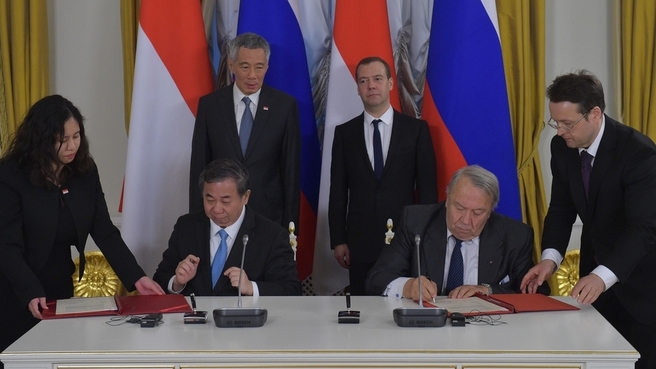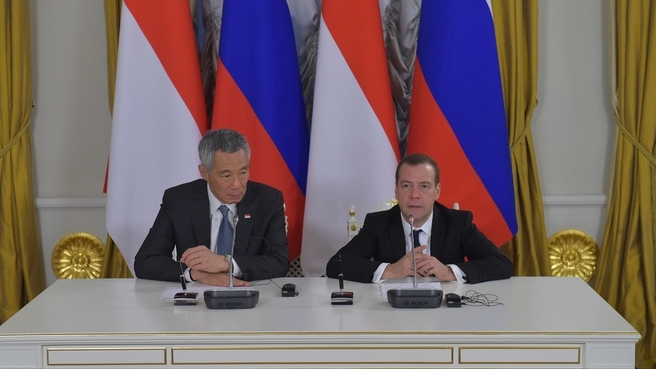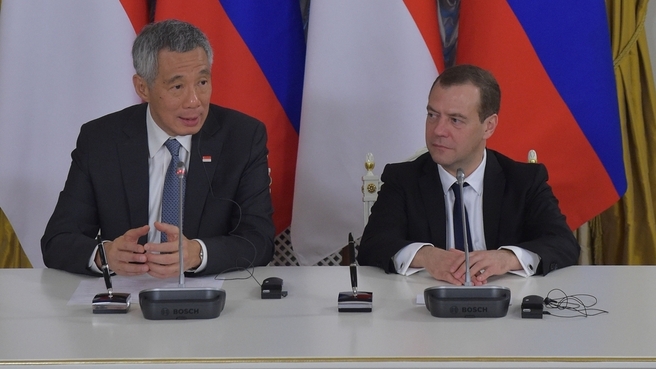Dmitry Medvedev held talks with Prime Minister of Singapore Lee Hsien Loong.
Dmitry Medvedev’s talks with Prime Minister of Singapore Lee Hsien Loong
Documents signed following the talks
Statements for the press by Dmitry Medvedev and Lee Hsien Loong
Dmitry Medvedev’s talks with Prime Minister of Singapore Lee Hsien Loong
Excerpt from the transcript:
Dmitry Medvedev holding talks with Prime Minister of Lee Hsien Loong
Dmitry Medvedev: I am very pleased that the Prime Minister of Singapore has come on a visit to Russia. I know that you have talked with your Russian colleagues and you will hold talks today, after which you will go to Sochi for the ASEAN-Russia Summit.
All of this is very important for deepening Russia-Singapore cooperation, for increasing Russia’s presence in the region and for a better understanding of developments in ASEAN countries.
I believe that our talks will be very useful and will contribute to the strengthening of our relations, which have been developing very well for the past few years.
Lee Hsien Loong (via interpreter): Last year we met at the ASEAN Summit in Kuala Lumpur, and several months ago we held meetings with your colleagues.
The last time I was in Moscow was in 1978. The world has changed dramatically since then. You have a different country now, Russia. I am happy to have the opportunity to develop our bilateral relations. We have signed a memorandum of understanding with the Eurasian Economic Commission and our officials have exchanged opinions. I hope this will lead to official talks on a free trade area agreement.
We are happy with the current state of cooperation we have with Russia. Our trade, commercial exchanges and cultural relations are growing stronger. Today we will sign several memorandums of understanding. I view this as one more step forward.
<…>
After the talks, Dmitry Medvedev and Lee Hsien Loong attended a signing ceremony for the following documents:
Memorandum of Understanding between the Ministry of Culture of the Russian
Federation and the Ministry of Community Development, Youth and Sports of the
Republic of Singapore
Signatories: Deputy Minister
of Culture of the Russian Federation Alla Manilova and Ambassador of the Republic
of Singapore to the Russian Federation Lim Kheng Hua
Memorandum of Understanding between the Russian Academy of Sciences and
the Nanyang Technological University of Singapore
Signatories:
President of the Russian Academy of Sciences Academician Vladimir Fortov and Deputy
President and Provost of Nanyang Technological University of Singapore
Professor Boey Yin Chiang
Statements for the press by Dmitry Medvedev and Lee Hsien Loong
Excerpt from the transcript:
Dmitry Medvedev: Mr Prime Minister! Dear representatives of the media, colleagues,
I just met with my counterpart, the Prime Minister of Singapore, Mr Lee Hsien Loong. We talked about most of the main issues relating to our bilateral relations and discussed some regional issues. Our talks resulted in the signing of two memoranda, but this is our ongoing work, because some documents were signed recently during our intergovernmental commission, and more documents are being prepared. Nevertheless, it is important that new documents were signed today.
Russia and Singapore have very good relations. We meet regularly, we have established good contacts. We met at the East Asia Summit in Malaysia last year, and, of course, during my visit to Singapore in 2009, and at other summits. What does this mean? This means that we aim to strengthen our partnership, to bring new issues into our dialogue and to celebrate our anniversary (anniversaries are good things, even in international relations) - 2018 will mark 50 years of diplomatic relations between our countries. We agreed that we will make the necessary preparations for this event.
Today, first of all we talked about trade, investment relations, and projects currently being implemented. Regarding trade volumes, they might not be in the best shape these days, but this is due primarily to the structure of our trade. Hydrocarbons – oil – still account for the bulk of supplies from the Russian Federation, and the price of oil is low enough, as you know, hence the drop in absolute numbers. But apart from these figures, if we talk about the physical volumes, in this sense, our trade fares well, and, for example, imports of many goods and equipment that we buy in Singapore, are on the rise. This is also a good sign.
Ongoing projects in our countries relate to many different areas of cooperation – transportation infrastructure, shipbuilding, airports, and of course, major energy projects. Agriculture has been added to these areas recently, and we talked quite a lot about it today. On the whole, almost all of the important sectors of our economies were included in the scope of our joint attention.
There is yet another important area of cooperation that has emerged in recent years. It concerns regional cooperation and the use of modern forms of trade relations. I am referring to a free trade area. We have created our integration union, the Eurasian Union, and our partners are keen to establish special trade relations with the Eurasian Union. Singapore has shown an interest and my counterpart has met with Mr Sargsyan, who heads the Eurasian Union’s executive division. We hope that this subject will also be of use for promoting our relations and, of course, for developing regional cooperation.
We have discussed international issues of interest for both our countries. These are related to the main challenges existing in the world today, such as terrorism, cross-border crime, and regional problems that concern our countries. Naturally, we have agreed to continue this important dialogue.
But what is possibly the most important thing is that we ensure that direct contacts involving businesses, experts and scientists are maintained alongside governmental contacts. Mr Prime Minister was active during these days meeting with members of the Russian business community, with his colleagues, who always pursue a keen dialogue on how Singapore, a country with many achievements, has developed. People in my country are known to be highly interested in state governance and the business models that Singapore has employed. We have agreed to continue this dialogue as well.
For my part I would like to invite our friends from Singapore to attend various events scheduled to be held in this country – the St Petersburg Economic Forum, the Sochi Economic Forum, Open Innovations, and others.
I thank the Prime Minister, Mr Lee Hsien Loong, for our constructive dialogue and wish him a successful working visit while in Sochi. Thank you once again for coming to this country.
Lee Hsien Loong (via interpreter): Thank you very much, Mr Prime Minister, for your cordial remarks, for your warm hospitality, and for the reception given to our delegation here in Moscow. I am happy to meet you again. The previous time we met in Kuala Lumpur last year. We have deep and long-standing relations with Russia. They began soon after Singapore declared independence over 50 years ago. Later, in 1968, we established diplomatic relations.
My father, Mr Lee Kuan Yew, believed that Russia would play a global role in this world, in global affairs, and for this reason he told me to learn Russian. He paid his first visit to Russia in 1970, followed by another five or so visits. He maintained contacts even after his resignation. He was keen on the Skolkovo school of management and was member of its board. He showed much enthusiasm in supporting the Russia-Singapore Business Forum and helped to establish contacts between businessmen and strengthen our economic ties. I am glad to continue promoting our relations.
This visit is a significant milestone, and one that was long overdue, because I last visited Moscow almost 40 years ago. It was in 1972, when I was a student. I spent a few weeks in Moscow and in the city then called Leningrad. Now, some things have changed here. Well, Red Square and the Kremlin, Tsar Bell and Tsar Cannon are in the same places, huge as ever. I also visited the Novodevichy Convent, and Novodevichy Cemetery. They have not changed either, and are just as beautiful, just as ancient. But in many other aspects, Moscow has changed. Just as the world has changed completely, so has Moscow.
Two days ago I had dinner on the 22nd floor of the Russian Academy of Sciences building. I looked around from up there, at Moscow, the Moskva River, the skyscrapers, the big modern buildings in the financial center of Moscow.
Prime Minister Medvedev and I have held productive discussions, summed up the state of our relations, our cooperation. We discussed ways to improve our relations, especially economic relations between our countries, and how to achieve growth by investing in each other. Many Singaporean companies are successfully operating in Russia – Food Empire Holdings, Educare, Amtel, and Changi Airport International is a co-operator of several airports in Russia, including the Sochi airport, where I will fly today.
Our trade is growing rapidly, and has increased four-fold over the past 10 years, I mean in absolute size. Nevertheless, our mutual trade can still increase greatly. Russia is our 21st largest trade partner, and there is great potential for the development of our trade, our economic relations with Russia.
Last year, Prime Minister Medvedev and I pointed out progress made by the intergovernmental commission, especially on the creation of a free trade area between Singapore and the EAEU. I am very glad that yesterday we signed a memorandum of understanding between the Eurasian Economic Commission and Singapore outlining cooperation areas and offering opportunities for feasibility studies and talks on the creation of a free trade area.
This will give a fresh impetus to cooperation between our companies and strengthen cooperation between our regions.
Of course, our economic ties have grown stronger, just as our cultural relations. A Russian culture centre will be built in Singapore. It will be located in a very good place, and I look forward to the day when I will see the golden domes of a Russian church in Singapore.
The universities of our countries maintain cooperation relations in the areas of research and technology and also student exchanges. Many Singaporeans study in Russia. I have met with students from my alma mater... We did not have such exchange programmes before, which points to big progress in this area. We have done a great deal towards implementing the potential of our cultural, educational and humanitarian exchanges.
Russia is playing a major role in Eurasia. In particular, Russia is contributing to the denuclearisation of the Korean Peninsula and is involved in the affairs of Southeast Asia, where it is an ASEAN dialogue partner. We also have a cooperation mechanism at ASEAN’s regional forums. I am looking forward to the ASEAN-Russia Summit in Sochi.
I would like to once again express my gratitude to Mr Medvedev for his hospitality. I hope both our countries will honour their commitment to improve our relations in all spheres. It is important that we have formed a high-level Russia-Singapore intergovernmental commission chaired by Deputy Prime Minister [Igor] Shuvalov. We maintain cooperation in many spheres such as culture, education, healthcare and legislation, and are building up our counterterrorism efforts.
In 2018, we will mark 50 years of our diplomatic relations. I hope that we will open the Russian culture centre in Singapore and create the EAEU-Singapore free trade area by that time.
Thank you.














